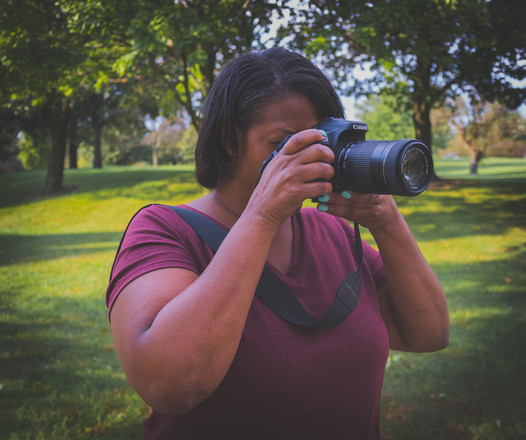CU photographer talks importance of technique, attention when photographing Black clients

Photo courtesy of Kreative Vision Photography Website
Evette Campbell takes pictures during a photo session session. Cambell’s studio, Kreative Vision Photography, provides sessions for portraits, families, weddings, and more.
Jan 26, 2022
Evette Campbell said that when she launched her photography studio it seemed to her that people were moving away from taking family photos on a regular basis.
Meeting various families and watching them grow throughout the years has been a highlight of Campbell’s practice, she said.
“It’s just really, really important to take pictures of any and everything as part of your family history — it can be part of your local community history,” she said.
Campbell launched Kreative Vision Photography in 2015. The Champaign-based photographer offers on-site and in-studio portrait, family, wedding and graduation photography services.
Campbell, originally from Virginia, arrived in Champaign in 1998 when her stepfather retired from the military. Interested in the arts, she enrolled in a photography class during her time studying at Parkland College.
Get The Daily Illini in your inbox!
Campbell put her interest in photography on hold when she started a family. When her daughter began to show an interest in photography during her high school years, Campbell’s passion was rekindled.
The photography industry has shifted to digital since Campbell began shooting on film.
Researchers and photographers said that until recently, it was difficult to capture darker skin tones, especially when paired with bright colors.
In a 2009 paper, Lorna Roth — now a distinguished professor emerita of Concordia University — explained that skin-color balance in film photography was calibrated to accurately capture lighter skin tones.
Color balance images for digital photography vary in their approaches to skin complexion; some, Roth explained, continue to favor light tones while others feature a more complex, wider range of tones and bright colors.
Campbell studied the techniques necessary to accurately capture clients’ skin tones early on in her career, she said.
“I will say that’s one thing that some of my clients come back to me for, is because they know that I’ll get skin tones right,” Campbell said. “Or they’re just more comfortable with capturing them or their family in a certain way versus, maybe, another photographer.”
Affordability, Campbell said, is another important part of her business.
“I always tell myself I don’t want to be so expensive where people just stop taking pictures,” she said.
Outside of helping families document their personal histories, Campbell is interested in local histories. Two years ago, she started interviewing north Champaign’s community of older adults to document the area’s history.
“Black History Month is important just to remind people that, you know, it’s everybody’s history … it’s just way more stories out there than what you learn in school,” she said.
Campbell thinks that Black-owned small businesses in particular tend to struggle with advertising.
In the past, she has worked with small businesses to create promotional content. About a year ago, she conducted a photo and video shoot for a local barber who sold beard culture merchandise.
Four years into her professional photography practice, Campbell became interested in fashion photography, which she described as more creative.
Her work has been published in small fashion industry-oriented magazines.
Fostering a community of local creatives is important to Campbell. She has hosted network events branded under the “Kreative Kollective” name in hopes of connecting photographers with models, mentors and other creatives, she said.
She said she hopes to open a larger studio rental facility for the public later this year.
As Campbell’s photography practice expands, she said she continues to encourage people and families to have their pictures taken.
“You need to create memories,” she said. “Memories, memories, memories. Don’t you remember going to grandma’s house and she had, you know, pictures all over the wall; she had tons of albums to go through.”





